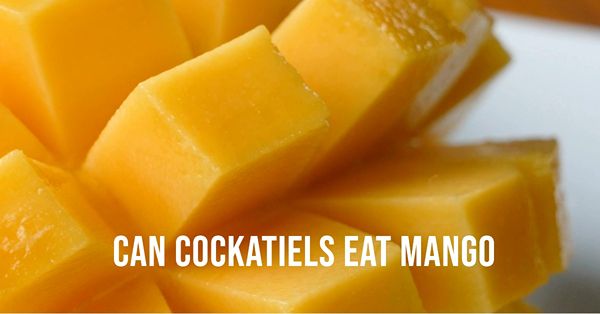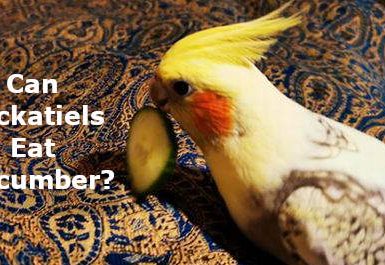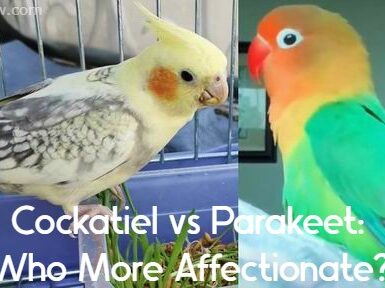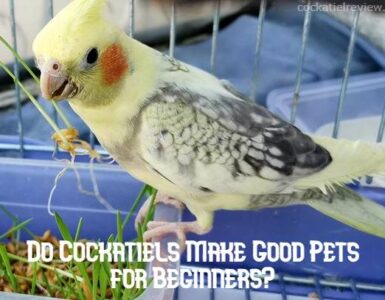
Сockatiels are small, smart and very curious parrots that fascinate their owners. Their diet is an important aspect of their care and owners should know what they can and cannot feed their pets. One question that often arises is whether you can feed mangoes to a cocoleon. This article will examine the question, provide recommendations regarding your cocoal diet, and tell you which foods are best to exclude from your diet.
Can I Feed Mango to Сockatiels in Feeding: rules, tips, parrot diet
Mangoes are a juicy, sweet, and very popular fruit that many people love. It contains many beneficial vitamins and minerals, including vitamin C, vitamin A, potassium, and beta-carotene. But can you feed mangoes to cholesteens?
The question seems simple enough at first glance, but in reality it requires careful investigation. The first step is to explore the eating habits of Сockatiel. They belong to a type of parrot, but have their own peculiarities and nutritional needs.
Importance of Proper Diet for Birds
A bird’s diet is one of the most important aspects of their health and well being. Improper nutrition can lead to many problems, including immune system disorders, liver and heart disease, obesity, and other ailments.
Each species of bird has unique nutritional needs and bird owners should consider their bird’s requirements very carefully. Therefore, before buying a bird, it is important to find out the type of food it needs, including seeds, vitamins, fruits, and vegetables.
Variety in a bird’s menu not only helps maintain their health and fitness, but can also improve mood and personality, leading to more enjoyable interactions between the animal and its owner.
Another important aspect of a bird’s diet is the proper quantitative proportions of all ingredients in the food. For example, excessively fatty foods can lead to obesity and other diseases, while deficiencies in vitamins and minerals can lead to a weakened immune system and disease.
Which of the following parameters are important for the health of cockatiels?
Diet: Since they are vegetarians, their diet must be rich in protein, vitamins, and minerals. Their main foods are fruits, vegetables, grains, and bread.
Moisture: cockatiels need a fairly high moisture content of at least 60% humidity. Problems can occur if the moisture in the environment is very low, in which case the birds can fall victim to bacterial and viral diseases.
Lighting: Koals take 12-14 hours per day of natural lighting plus 8 hours from light fixtures. If birds do not have adequate light, they may develop bone and muscle diseases.
Temperature: cockatiels can live at room temperature, but avoid high temperature fluctuations. Their optimal temperature is 20-25 degrees Celsius. If birds are kept in cold rooms, they may develop respiratory diseases and illnesses.
- Proper diet,
- Maintaining a high level of moisture in the house,
- Good lighting,
- Comfortable room temperature.
Why take care of your bird’s diet?
Proper nutrition is one of the basic requirements for the health and longevity of birds. A varied and balanced diet consisting of a variety of foods is necessary.
Nutrient deficiencies can lead to a variety of diseases, lack of energy, and general condition deterioration.
Since each species of bird has its own specific nutritional requirements, the proper nutrition of each bird must be monitored individually and nutritional recommendations strictly followed.
Dietary controls avoid the consumption of certain types of foods, such as sugar, fruits, and nuts.
- Proper nutritional compliance ensures optimal growth, evolution, and health of the birds.
- Nutritional control is also a preventive measure to avoid disease and improve overall health.
- Strict compliance with nutritional instructions helps avoid excessive consumption of certain types of food.
Can I supply mangoes to Cocare?
By answering this question, you can safely say that yes, you can feed mango mango in your cocker. It is a fruit that is harmless to birds and contains many nutrients.
However, you should not overstate mangoes as a food for corellel. They should take a balanced diet that includes fruits as well as vegetables, grains, eggs, and seafood.
In addition, it is important to remember that fruits should not remain in the cage for more than two to three hours to avoid the possibility of bacterial spoilage and infection of birds.
To differentiate the pet’s diet, mangoes can be given every other day and several times a week, but only in moderation.
Benefits of Mangoes for Birds
– A rich source of vitamin C, mangoes are high in vitamin C, which is an important antioxidant and helps strengthen the bird’s immune system.
– Natural Source of Carotene – Mangoes contain carotene. Carotene helps protect the eyes from environmental hazards.
– Rich source of nutrients – Mangoes contain many important nutrients such as potassium, magnesium, iron, phosphorus, and vitamins in different groups that help maintain bird health.
– Versatile Product – Mango can be used as a base for a variety of dishes and delicacies for birds. This further distinguishes the meal from the food’s appeal.
How to Feed Mangoes to Birds
First rule: mangoes must be fresh and ripe. Never feed mangoes to chickens that have already begun to stain or rot areas. Fresh mangoes usually have bright yellow skin and a sweet taste.
The second rule is to remove the rind and pumice. Roosters can wait to get the pulp from the fruit themselves, but it is best to prepare the bird for the birds in advance. Cut the pulp into pieces and show it to the bird – he will accept him with pleasure.
Third rule: do not offer the bird too many mangoes. Too much fruit can cause stomach discomfort to the bird, so start giving small pieces and see how your pet reacts.
Fourth rule: Mangoes should not be your bird’s primary diet. This fruit should be considered a delicacy that you give your bird occasionally. Your cockatiel’s daily diet should include seeds, fresh fruits, vegetables, and other foods.
What other fruits can I feed my cockatiel?
Mangoes as well as many other fruits can be fed to honey. It should be noted that parrots love sweet fruits, but they cannot be all that good for their health. It is important to choose the right fruits, feed the birds and follow a balanced diet.
– Apples. Apples are one of the best choices for cockatiels. They are rich in nutrients and vitamins. Additionally, apples are fat free and rich in fiber.
– Pears. Both parrots and pears love them. In addition, they contain vitamins C and A. In addition, pears are rich in fiber, which helps birds cope with stomach problems.
– Mandarins. Tangerines contain vitamins C and B, which can strengthen a parrot’s immune system. Tangerine is also rich in fiber and sugar, a tasty delicacy for birds.
In addition to the aforementioned fruits, grapes, oranges, kiwis, and peaches can be given as delicacies. However, do not exaggerate on sweet treats. This can lead to obesity and increased fat in the bird’s body, which can cause illness. It is important to provide your cockatiel with a proper balanced diet. This should include fruits as well as vegetables, grains, cereals, and protein products.
How to Feed Fruits Appropriately
1. selecting appropriate fruits
Before adding fruit to a bird’s diet, you must make sure it is safe. Some fruits may contain substances that are dangerous to the bird’s health. For example, avocados are toxic to certain species of birds.
2. prepare the fruit
Rinse the fruit before feeding it to the bird. You should also remove any skin or seeds that may be harmful to the bird. The fruit should be cut into small pieces so that the bird can easily digest it. Any inedible fruit residue should be removed from the bird’s diet so that there is no risk of choking from swallowing.
3. how often should fruit be fed?
Fruits should not become a basic food for birds, but they can serve as an additional source of food. It is recommended that you feed fruit to birds no more than two to three times per week. Also, the amount of fruit should not exceed 10% of the bird’s overall diet. After adding fruit to the diet, watch the bird’s behavior. If you notice any changes in the bird’s behavior, diet, or health, you should remove the fruit from the diet and contact your veterinarian.
Recommendations for the integration of the Сockatiel diet
Synthesize a bouquet of vegetables: Corel is very similar to vegetables and can be fed daily. It is advisable to introduce foods of different colors to the diet: carrots, cabbage, beet, cucumbers, eggplant, tomatoes. Hot peppers, zucchini, potatoes and green peas are not recommended.
Fruits: Corrells can eat fruits, especially apples, pears, peaches, and plums. Figs, bananas, apricots, and nectarines can also be given, but remember that fruits should be given in limited amounts.
Cereal foods: Cereal diets (oats, barley, wheat) are very important for Сockatiel. They are the basis of the diet and must be introduced daily. For diversity, corn, millet, and bran feeds can be added.
Various Supplements: A variety of supplements can be added to the diet. Calcium, important for parrots, can be added by inserting natural or mineral stones (chalk flavored). A variety of green food herbs can also be offered, such as Tarragon, Coriander, Parsley, and Lettuce.
Adjusting the diet: the cocachiel diet should be balanced and consist of a variety of food groups. The total amount of food will depend on each bird’s age, weight, and activity level. Food amounts should be monitored and modified as needed.
WATER: Coles should have access to fresh water 24 hours per day. Water should be placed in sprinkling water to maintain its quality and allow easy access for the birds.
Which foods should not be given to the birds?
- Chocolate: chocolate contains theobromine, which can cause serious poisoning in birds.
- Alcohol: Alcoholic beverages can have serious consequences for the bird’s health.
- Salt: Too much salt can be detrimental to a bird’s health and can lead to dehydration and other problems.
- Oily Foods: Oily foods can lead to digestive problems in birds and obesity.
- Sweets: Sweets contain a lot of sugar and can be detrimental to a bird’s health.
Questions and Answers:
Question: Can I feed mangoes in my cockerels?
Answer: Yes, you can. Mangoes contain vitamins and minerals necessary for bird health. However, mangoes should be carefully included in the diet in small quantities two to three times a week. They contain a lot of sugar and can cause digestive problems when consumed.
Question: What other fruits can I give them?
Answer: Korlia can eat most fruits, including apples, pears, peaches, strawberries, gooseberries, and carpets. However, not all fruits are safe for pets. For example, grapes and avocados should not be given because they can be toxic.
Q: What supplements can I use with the Cocachiel Diet?
ANSWER: Vitamins and minerals, calcium and phosphorus complexes can be added to keep the birds healthy. You can also add a special mixture of seeds specifically designed for birds.
Question: How often do I need to feed the cockatiels?
Ans: Cockerels need fresh food and water daily. Since birds can eat throughout the day, it is best to maintain a continuous food supply. The frequency of feeding depends on the age of the bird. Younger birds require more frequent feeding, mostly twice a day for adults.
Question: How do I teach cockatiels to eat fruit?
ANSWER: To start a bird eating fruit, you should start with a small portion of fruit and gradually add it to its diet. If the collaterals do not begin to eat fruit, you can try to pulverize the fruit and mix it with another food. It is important to remember that the introduction of new foods into the diet should be done with caution.






Add comment